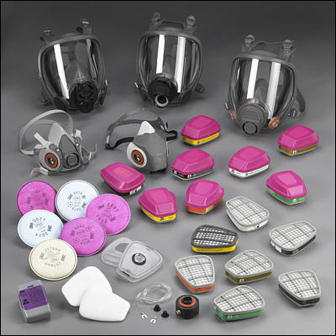Respiratory Protection
Overview
Highlights
- Understanding Compliance with OSHA's Respiratory Protection Standard During the Coronavirus Disease 2019 (COVID-19) Pandemic. OSHA, (August 2020).
- Seven Steps to Correctly Wear a Respirator at Work. OSHA Poster, (May 2020). Describes the steps for properly putting on and taking off a respirator.
- Putting on and Taking off a Mask. OSHA Video, (May 2020). Also available in Spanish.
- Respiratory Protection for Healthcare Workers. OSHA Video, (January 2011).
- The Difference Between Respirators and Surgical Masks. OSHA Video, (December 2009).
- Respirator Safety. Donning (Putting on) and Doffing (Taking off) and User Seal Checks. OSHA Video, (December 2009).
- OSHA Fit Testing Final Rule: Additional Ambient Aerosol CNC Quantitative Fit Testing Protocols: Respiratory Protection Standard. (September 2019). Adds two new quantitative fit testing protocols to Appendix A of OSHA's Respiratory Protection Standard.
- NIOSH Respiratory Protective Device Information Notice "Self-contained breathing apparatus (SCBA) user information regarding compressed breathing gas containers (cylinders), NIOSH approval holder user instructions, and Department of Transportation (DOT) permit and marking". (February 2019).
- NIOSH/OSHA/CDC Toolkit. Hospital Respiratory Protection Program Toolkit: Resources for Respirator Program Administrators (EPUB | MOBI). (2022). Assists hospitals in developing and implementing effective respiratory protection programs, with an emphasis on preventing the transmission of aerosol transmissible diseases (e.g., influenza, TB, SARS, MERS) to healthcare personnel. Appendix D is a template that can be used to customize your facilities program.
- Respirator Medical Evaluation Questionnaire Infosheet. OSHA Publication 3790, (May 2015).
- Small Entity Compliance Guide for the Respiratory Protection Standard. (2011).

Millions of workers are required to wear respirators in various workplaces throughout the United States. Respirators protect workers against insufficient oxygen environments, harmful dusts, fogs, smokes, mists, gases, vapors, and sprays. These hazards may cause cancer, lung impairment, diseases, or death. Compliance with the OSHA Respiratory Protection Standard could avert hundreds of deaths and thousands of illnesses annually.
Respirators protect the user in two basic ways. The first is by the removal of contaminants from the air. Respirators of this type include particulate respirators, which filter out airborne particles, and air-purifying respirators with cartridges/canisters which filter out chemicals and gases. Other respirators protect by supplying clean respirable air from another source. Respirators that fall into this category include airline respirators, which use compressed air from a remote source, and self-contained breathing apparatus (SCBA), which include their own air supply.
General Guidance
Provides links to a variety of guidance documents, web pages, and online tools related to respiratory protection.
Respiratory Protection Training Videos
Links to a variety of training videos related to respiratory protection.
Standards
Respiratory protection is addressed in specific OSHA standards for general industry, maritime, and construction.
Enforcement
Highlights the most commonly used OSHA directives (instructions to OSHA staff) and letters of interpretation (official letters of interpretation of the standards) related to respiratory protection.

